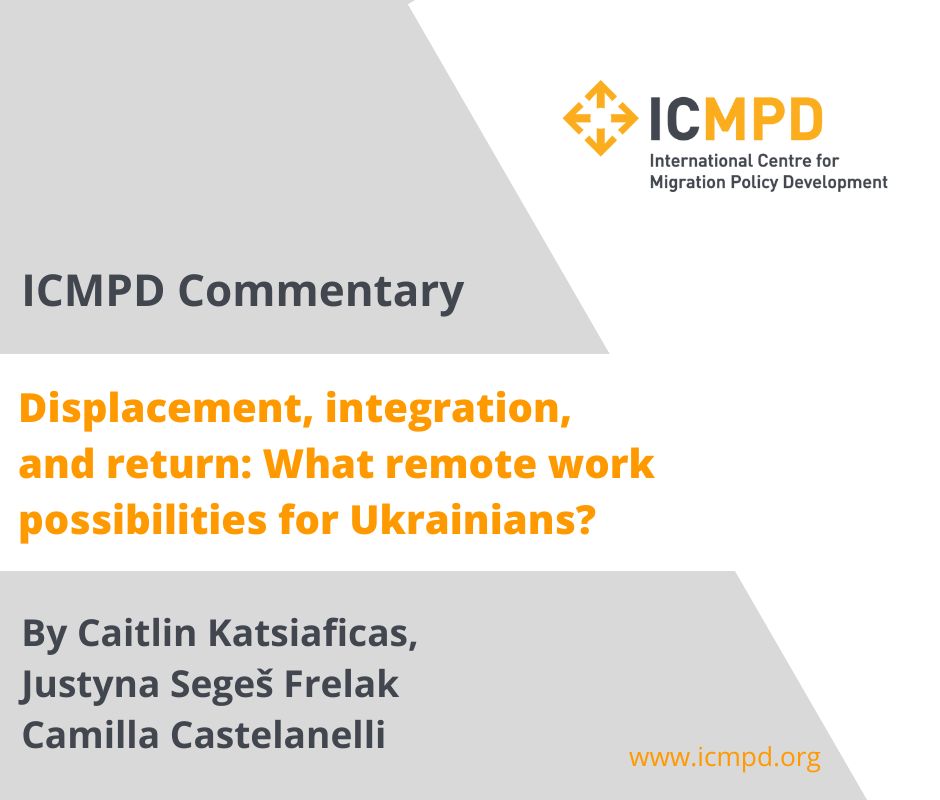One year after the Russian invasion, much uncertainty remains. Remote work can provide a degree of flexibility for some refugees from Ukraine, supporting integration in the short term and reconstruction in the long term. Supporting Ukrainian teleworkers is a smart move.
The Commentary, published on 21 February 2023 on the website www.icmpd.org, and prepared by Caitlin Katsiaficas, Justyna Segeš Frelak and Camilla Castelanelli highlights existing challenges and opportunities for remote work in several EU countries hosting Ukrainians as well as benefits it could bring.
More than 8 million people have fled Ukraine in the year since Russia’s invasion brought a new chapter of interstate war to Europe. In a span of just several months, displacement from Ukraine became one of the largest displacement crises in the world. Persons fleeing Ukraine are entitled to obtain temporary protection (which includes the right to work) in the European Union country of their choice, while other countries in Europe and farther afield have made new or existing pathways available to quickly admit them to their territory. Although exact figures are unavailable, a considerable number of displaced Ukrainians are working remotely thanks in part to an increasingly digital world of work, as well as digital literacy, equipment, and internet access. Some continue to work for Ukrainian companies, while others are working for local employers in their countries of temporary protection or even in a third country. Meanwhile, approximately 18% of internally displaced Ukrainians are working remotely. Evidently the ability to telework provides expanded opportunities in challenging circumstances.
Expanding possibilities in the context of displacement
Instead of looking for new job opportunities in host countries, some refugees have been able to keep the positions they held in Ukraine thanks to the possibility of remote work. In a recent Czech survey, 19% of employed respondents reported working remotely for a Ukrainian company. In Warsaw, as many as 24% of persons registered with local labour authorities were working for an employer in Ukraine in September last year. For this group, the possibility to telework from another country means retaining a steady source of income and more stability in a difficult situation. This livelihood continuity can help support the self-sufficiency of those moving to a new place.
Working remotely can also enable newcomers to continue in their previous field or occupation, which may result in higher pay or quality of work than jobs that may be available in host countries. Meanwhile, for those wishing to return to Ukraine, the ability to retain a remote job in EU countries could facilitate return even as local economies recover from the impact of war (providing that local infrastructure is able to support this). Given the destruction that the war has caused, the International Labour Organization estimated a 15.5% decline in employment in Ukraine in 2022 compared to the previous year – a loss of 2.4 million jobs. Rural livelihoods in eastern Ukraine are particularly hard hit by the war. While the trajectory of the war remains uncertain, it is clear that reconstruction will be a lengthy process, and remote work might enable some to return sooner.
Potential roadblocks to realising the potential of remote work
Working remotely raises questions in terms of taxation as, after 183 days of staying abroad, foreigners can be recognised as local tax residents. So far, just a handful of EU Member States have tried to address the specific situation of Ukrainian remote workers. For example, Lithuania (until the end of the war) and Ireland (for the 2022 tax year) have enabled Ukrainians to pay taxes exclusively to the Ukrainian government, allowing remote workers to provide financial support for Ukraine’s war effort and/or reconstruction. Additionally, while there are agreements between Ukraine and all EU Member States that aim to avoid double taxation, the necessary procedures are challenging in wartime.
Supporting multiple trajectories amid continued uncertainty
Remote work opportunities have typically been seen as a way to negate the need for further movement by increasing opportunities for refugees where they are. However, in the context of displacement from Ukraine, remote work has the potential to complement and even support mobility – including movement out of Ukraine, integration in host countries, and potential return. Not only can this benefit the livelihoods and broader integration of refugees, it also has the potential to assist in the reconstruction of Ukraine in the longer run. For that to happen in a larger and more sustainable way, legal and practical measures must catch up with the growing online work environment to better serve Ukrainian remote workers but also refugees and migrants more broadly.
Read the whole article on the ICMPD website

